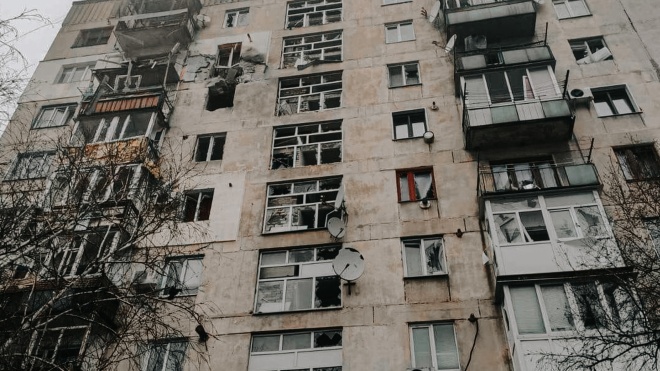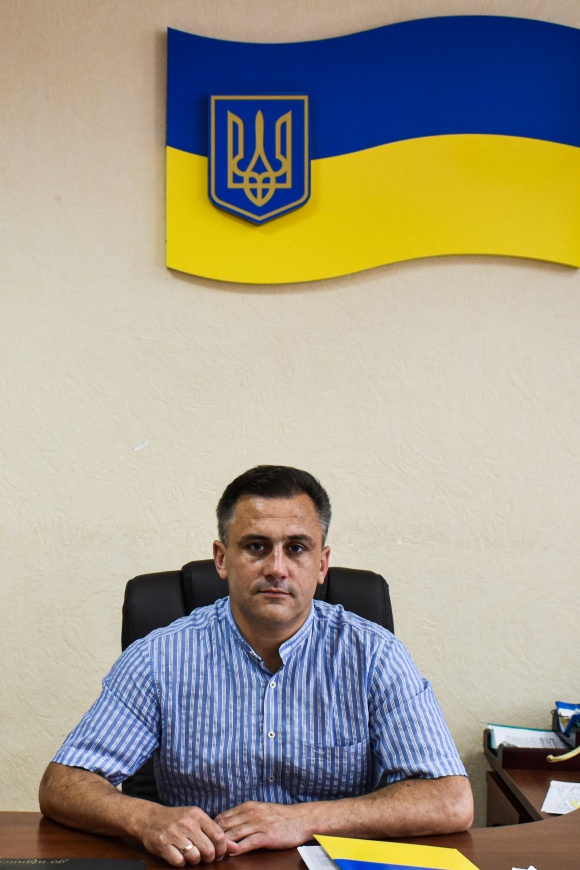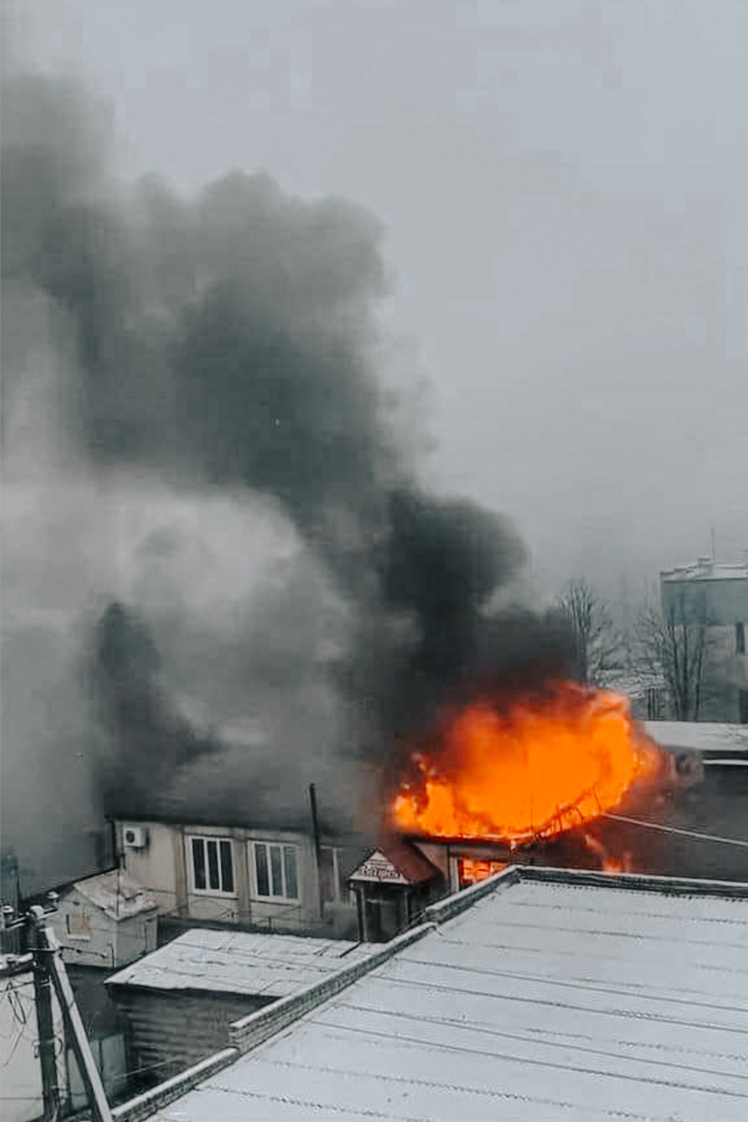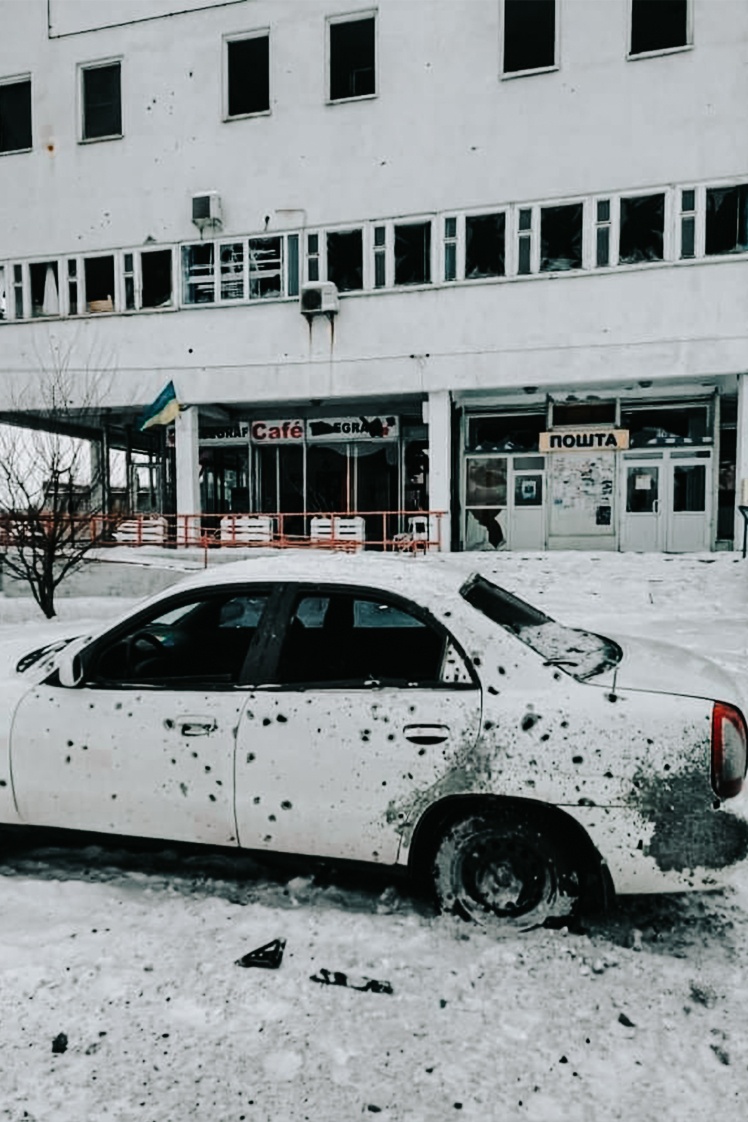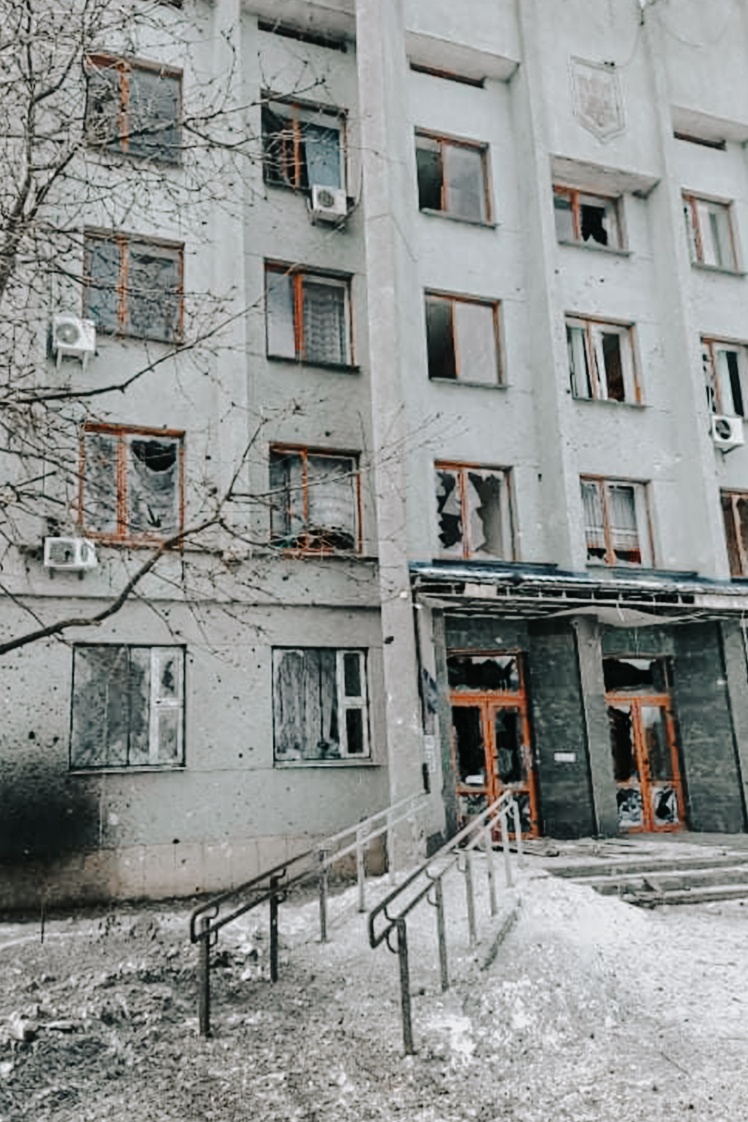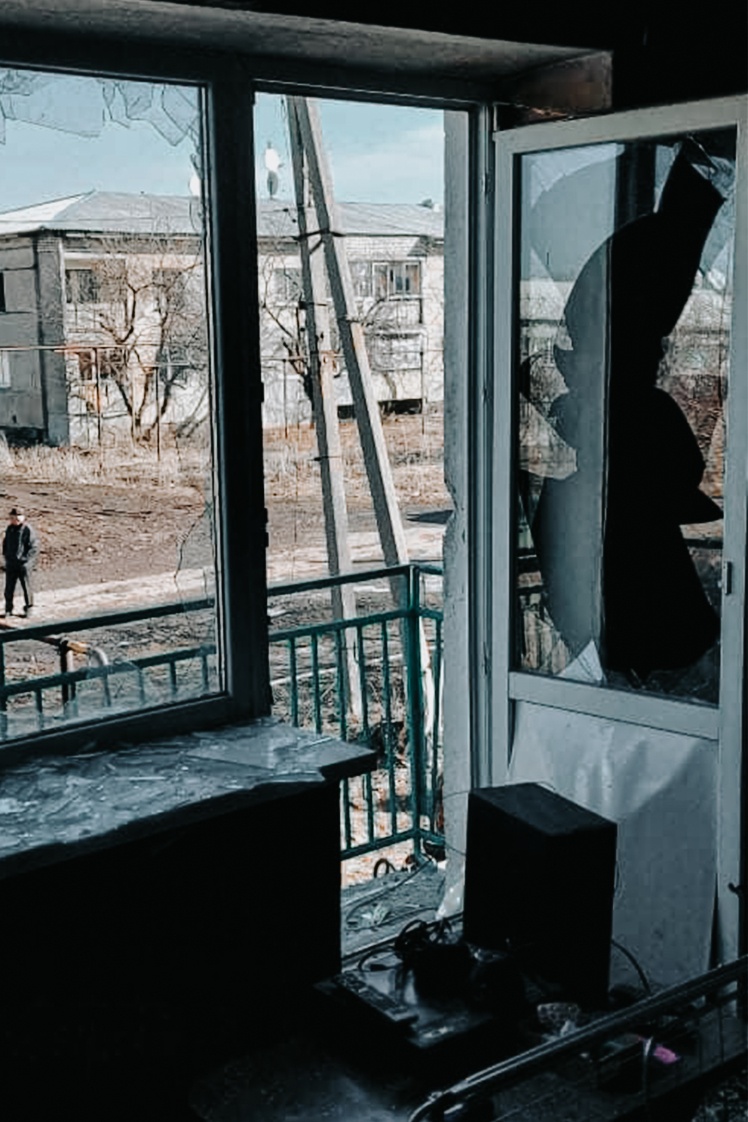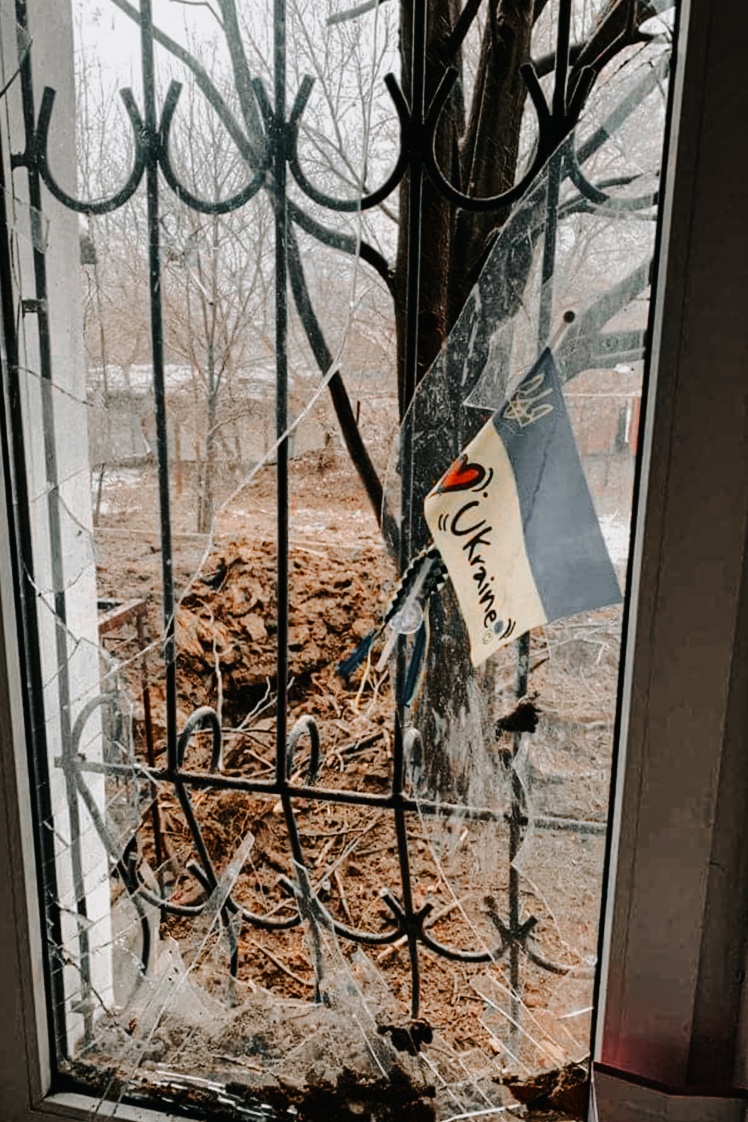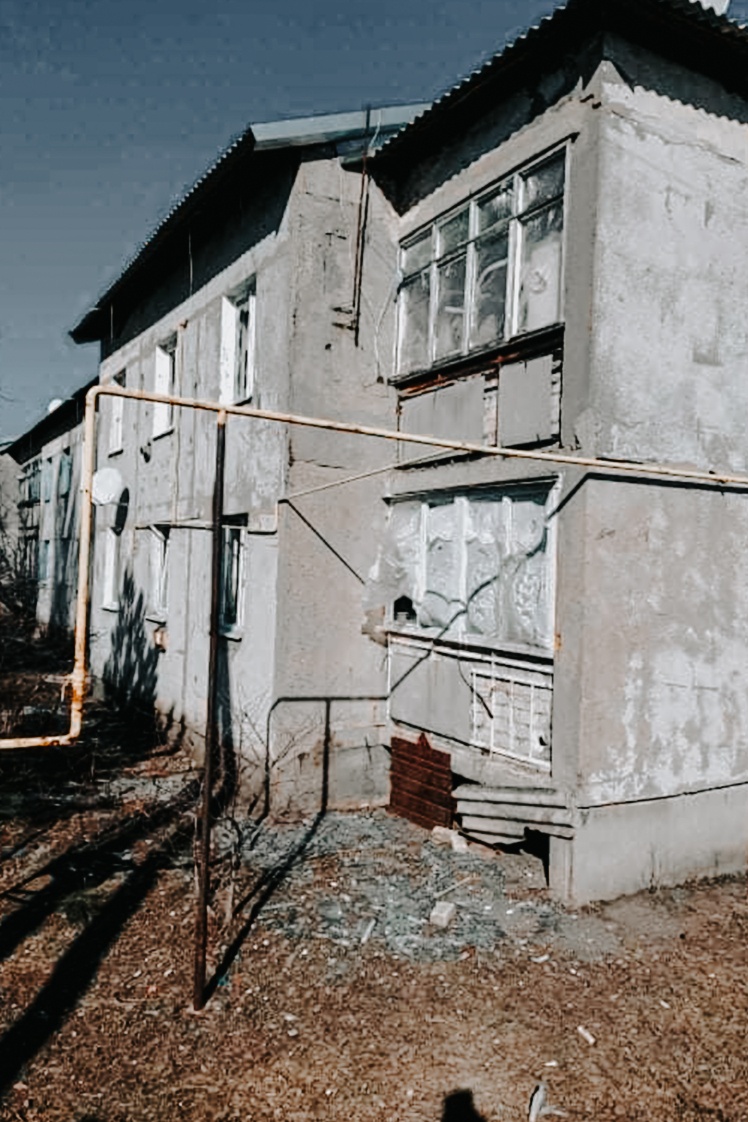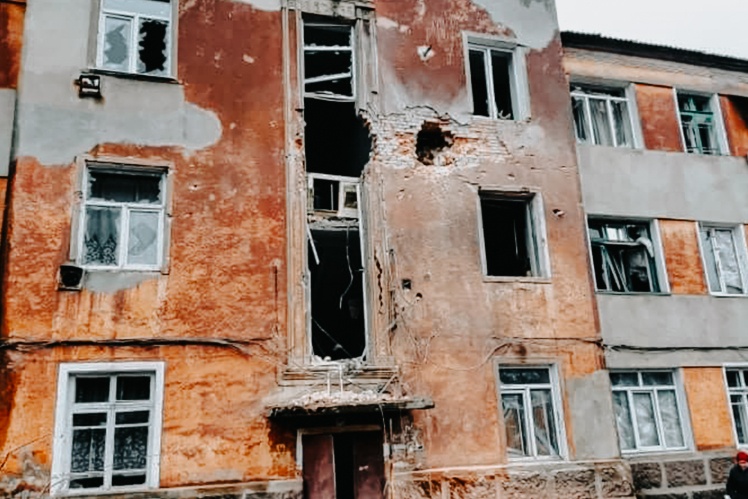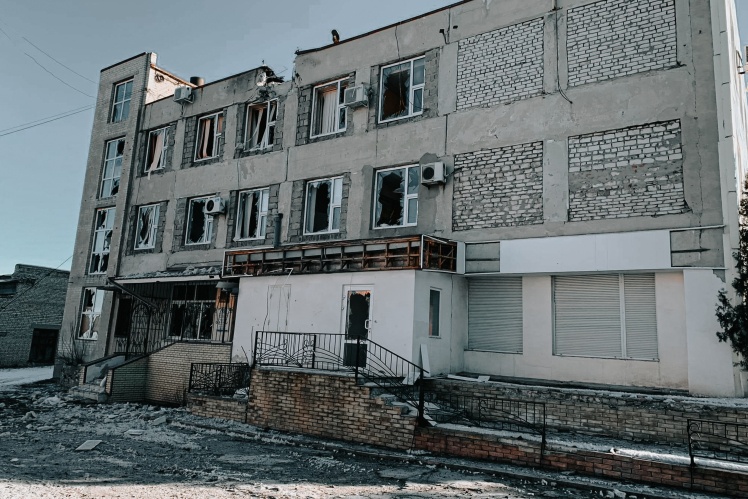You were born in Moscow. How did you end up in Popasna?
My father is from Popasna and my mother is from Moscow. My father missed Ukraine, Popasna, listened to songs like Chervona Ruta, and he always wanted to go home. In 1981, a few months after my birth, we returned to Popasna. In high school, after my fatherʼs death, I decided to return to Moscow. But after graduating from school, I realized that I wanted to return to Popasna. So since 1996 I live here.
Mykola Khanatov, the head of the Popasna Military Administration.
What was the city like before [the hostilities started in] 2014?
It is a small but very beautiful city, a neat one. Itʼs industrial, many railway companies were there. By 2013, it was home to 22,000 people. It used to be part of Popasna district, was its administrative center.
Until 2014, Popasna was very tolerant. Russians, Ukrainians and people of other nationalities lived here. Most people spoke Russian. But in Popasna district there are villages Troitske, Golubivske, Komyshuvakha, Kalynove — there people also spoke Ukrainian. Nobody payed attention to the language. However, when the ruling party was the Party of Regions, the district council decided to recognize Russian as a language to be used by the local authorities.
«Babel'»
Has anything changed since 2014?
Until 2014, all Popasnians perceived Russia as their older brother. Many residents went to Russia to earn money, and President Putin was treated with respect. Frankly speaking, most people after Crimea looked on Russia, supported the “referendum” and even went to the polls. But then the attitude changed. Ukraine has regained its control over Popasna, our country has invested a lot of energy, money and respect in Ukrainian Popasna. Popasna blossomed again. The European Union also helped in the development of the city. Therefore, in 2014-2022, the opinions of Popasnyans were divided somewhere between 50 and 50. Now that Russia has begun to destroy the city, the vast majority of residents fully support Ukraine. People believe in the Armed Forces of Ukraine, they elected our President Volodymyr Zelensky and trust him. They want all [hostilities] to end soon, Popasna to reborn and everyone to return home.
The city of Popasna in 2014.
The possible full-scale invasion of Russia has been talked about since November. Were you preparing for it in the city? Was the territorial defense organized?
We had the task of preparing an evacuation in case of full-scale aggression. But almost the entire population did not believe that this could happen. Even on February 24 and 25, when it all started, but Popasna had not yet been bombed, 5-10 people came to the evacuation trains organized by us. Nobody wanted to leave. We hoped that it would be as easy as in 2014-2015.
As for Territorial Defense, was it formed? Were people given weapons in the city? For example, in Kyiv, even before the full-scale aggression, people began to be recruited for the defense units.
We have a slightly different situation. The Popasna community belongs to the Lysychansk military staffing center and they were engaged in territorial defense. People from Popasna came to the authorities and asked if it was possible to join the defense and get weapons. They were told that the territorial defense was in Lysychansk, where they would be given weapons and people would come under the Lysychansk authorities. But locals wanted to defend Popasna, so they refused.
Ukrainian Servicemen the frontline outside of Popasna.
Popasna was under occupation for some time in 2014, then Ukraine returned its control over it. The city was fired at from artillery in 2015-2016. After that it was quiet. When did it become clear that the war had returned to Popasna?
For us it all began on March 2, 2022, when the first shells hit the city from Pervomaisk. They killed a man, the destruction started. But even at this time, life was still going on, and locals believed that everything would end soon.
And then?
Now the situation is very difficult. For the first two weeks we managed to restore water, gas, electricity, internet [after the blasts]. But the shellings became more and more intense, and now it is impossible to restore all this. We restore during the day, and at night they break it all down. Utility workers had to work under fire — it is very dangerous. So at some point we stopped doing this. In 2015 they didnʼt drop air bombs over us. Have you seen it? Those bombs from planes completely destroy big houses, whole sections of them.
What is the situation in the city now?
The Russians are already in Popasna, they control about half of the city.
And you can roughly orient yourself, half of the city on a conventional railway line, or on the street of Peace ?
Letʼs put it this way: divide Peace Street, but closer to the city of Pervomaisk. Although, they are already getting closer to Peace Street. They first come and go, come and go, and then get hold over an area.
So now there are street fights in the city?
Yes, yes. Today (on April 18) they were very powerful.
Are there any surviving houses in the city? Can you estimate the percentage of destroyed buildings?
It hurts a lot to call some percentage. The city is being shelled chaotically. The Russians are completely destroying all high-rise buildings and the entire private sector. Systematically. It seems to me that there are no surviving houses at all. There are simply high-rise buildings that is possible to restore, and those that are not. THe same is in Rubizhne and Lysychansk cities.
Is it understandable why they completely destroy these cities? For example, in Kherson oblast of the cities are almost intact.
The Russians were able to quickly capture the cities [in Kherson oblast] and consider them their own. Why should they destroy the city they have already taken? And they havenʼt been able to take our city for a month and a half. They have the following tactic: first they fire with artillery, then join tanks, then infantry comes. They are firing artillery, but we are repelling them, and their tanks cannot enter. As a result, they are stuck in the first phase.
This is a the same 9-storey building as on the title photo. It lwas destroyed by russian aerial bomb
Did the Russians come to you with any proposals and requirements?
No. Even in 2014 they did not come out. It seems to me that my position is too harsh for them, so they donʼt even try.
Do you know any cases of betrayal in Popasna? By the employees of some services, for example?
I donʼt know if any of the employees has betrayed [Ukraine]. We have both civil servants and law enforcement officials — these are young patriotic people, they are principled and professional.
Did the police or other services remain in Popasna?
I want to repeat and emphasize that Popasna is under very heavy fire. The police are not the service that is supposed to work under artillery fire.
And what is the situation with hospitals, with the wounded, with medicine in the city?
There is no medicine in the city. The acting director of the hospital left his job the next day [after the war started] and left. Then the hospital came under fire (this is not related to his departure, of course). The ambulance worked for a long time, but when the shelling became more frequent, its workers also were evacuated. Thatʼs why there are military doctors in the city now. They provide assistance whenever possible.
Does the cellular connection in Popasna work?
Mobile operators work in other settlements, and in Popasna the connection works if you get to the upper floors.
Letʼs talk about people. You said that people did not want to evacuate at first. How many people are left in the city now?
In my estimation, all over the city somewhere more than 2 thousand, but less than 3 thousand. By the way, Russians are evacuating people to Pervomaisk from the occupied part of Popasna.
I understand correctly that now, in this situation, people mostly live in bomb shelters or basements?
Mostly so.
A woman cries inside a bunker in Popasna, on April 14, 2022.
Getty Images / «Babel'»
I saw that you and the head of Luhansk oblast called on people to evacuate? Why didnʼt they do it?
First, people believe in the Armed Forces of Ukraine and that they will give a decent rebuff, that the Russians will leave and the locals wonʼt have to go anywhere. Secondly, many people have parents, relatives of the age of 85-90, they are often less mobile and have to be cared of. Some people say they have no money and doubt that anyone will take care of them. Some say that in 2014 they went (here — evacuated), even to relatives, [but that wasnʼt comfortable for any side]. You understand that a guest is a guest for only three days. People do not want to burden anyone with their presence.
But there are [national and international] programs, there is help for internally displaced persons, there are volunteers. Do people know about it?
Look, you have a nice cat. She will live with you in the apartment for 2-3 years, and it is no longer possible to let her out, because she will not adapt to the conditions outside the apartment. Similarly, many people have never left Popasna or the oblast. They have no idea how it can be [in other places]. They are insecure and afraid.
Now you are focused on delivering food to Popasna, and taking people out?
Thatʼs right, but not just food. As well as hygiene products, water, fuel for the generators. Today we had a very large humanitarian convoy. We were brought flashlights, batteries, things that allow us to heat food. They brought both fast food and food for long-term storage.
Youʼre not in Popasna all the time now, youʼre just coming to the city, right?
Yes, I donʼt live in Popasna. I visit Bakhmut. We even have our institution officially moved to Bakhmut city. When I need to solve the issue of humanitarian aid or support, I go to Dnipro city. I want to open another humanitarian hub there, because a lot of people from our district went to Dnipro. I want them to feel supported there. In addition, we deliver humanitarian aid not only to Popasna. Because the Popasna community, in addition to the city of Popasna, includes 13 other settlements.
Today you also had to deliver aid and pick up people. Did you succeed?
Today (April 18) aviation was bombing the city, and Popasna has never been shelled so densely and so hard as it was today. Thatʼs why we were advised not to go there today. We went to other settlements of the district. Personally, I donʼt go on every trip — it doesnʼt make sense, because there are many things Iʼm responsible for. But I also have to understand what is happening in the city.
But you even drive without a bulletproof vest.
Well, I want to tell you that the vest wonʼt help.
Bullet proof vests, helmets and a rpg7 grenade are pictured at the entrance of a food store in Popasna on April 14, 2022.
Getty Images / «Babel'»
Were there any green corridors for leaving Popasna and its district? Did Russians agree on them?
We were told that the corridor was officially agreed. It was March 19. We went to evacuate people from the regional boarding school, which is located in Popasna, and from the bomb shelter in the locomotive depot. And it was on this day that we came under fire and I received a concussion. Then was treated for a week.
Can you say approximately how many civilians have died in Popasna and related villages since February 24?
Thatʼs definitely more than a hundred people.
Can they be picked up and buried? I read that there is an entrepreneur Halyna Kroshka, who provided ritual services before the full-scale offensive, and now buries people for free.
Yes, she is engaged in burials, and we in turn provide her with everything necessary. There was a collapse, nothing could be bought, her vehicle broke down. We gave her one car, then another car. Due to the fact that humanitarian organizations support us with fuel, we give her fuel. Local running water operator helps with digging the graves. We bought plates to write information about the person on them. A humanitarian organization helped with the bags for the killed.
The killed are being collected under fire. And for the burial we chose a cemetery in the village of our community, where there is no shelling yet. I will not name it on purpose.
We support the people who are carrying humanitarian aid to Popasna today. We need a person who will say, "Iʼm going." And then for this person we do whatever he or she wants. Be it a car, a wheel, fuel — everything. I have no authority or moral right to force anyone to go to Popasna. It is life-threatening.
What does the city need now?
It is necessary to strengthen the defenders of Popasna, with manpower and the latest modern weapons, as much as possible. They need fire support. And you also need to go on the offensive. Because Popasna is almost gone, but there is still something. If such an invasion of the Russians continues, Popasna will not remain at all and there will be nothing to restore. Because people are already dying in shelters from shelling. Floors collapse, slabs fall and kill people. And there are no emergency services in the city that could help get out of the rubble. People try to dismantle the blockages themselves, but the structures are very heavy and cannot be lifted.
Translated from Ukrainian by Anton Semyzhenko.
Support Babel: donate in UAH 🔸 in cryptocurrency 🔸 via PayPal
